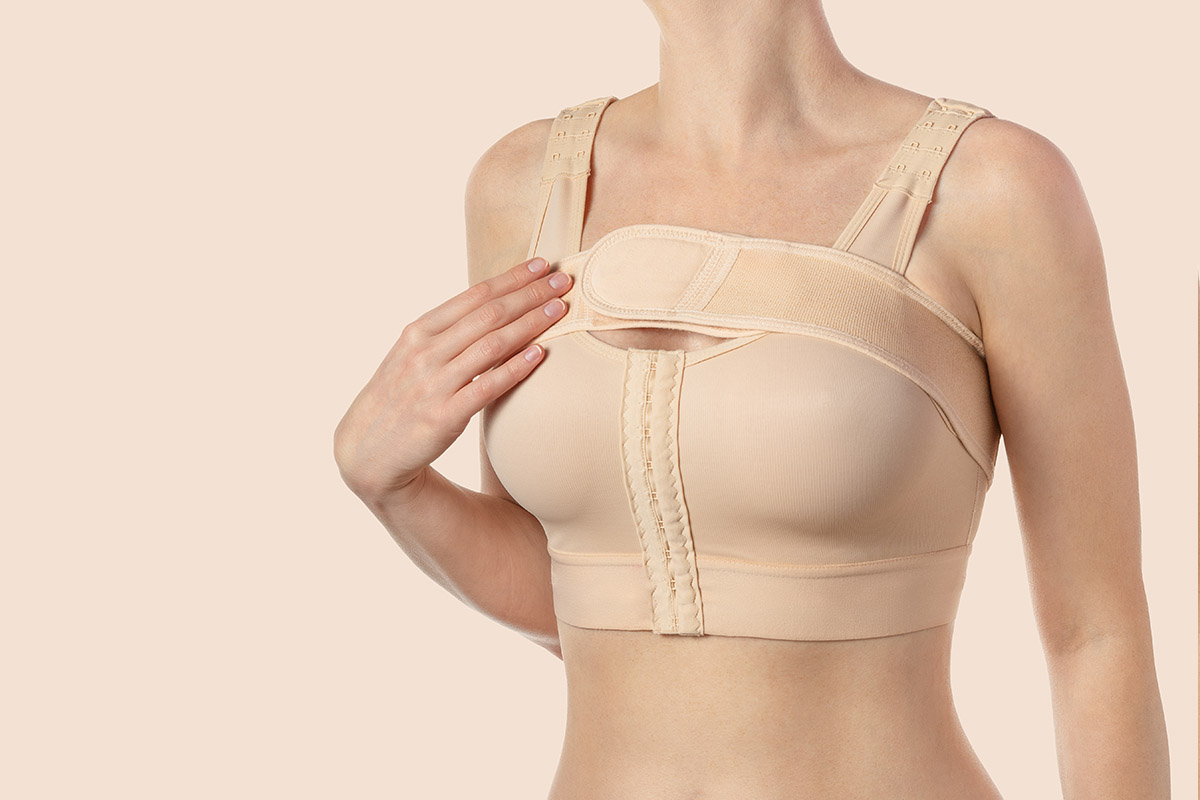Breast surgeries and maintaining a healthy body weight are both prevalent concerns in the UK. Whether you’re considering breast surgery or wondering how to maintain the results afterwards, it’s important to understand the impact of weight changes on your breast surgery results.
Between 2013 and 2023, 80,427 women in the UK have undergone breast augmentation surgeries, and 49,795 women in the UK have had a breast reduction. At the same time, 64% of adults in England were estimated to be overweight or obese between 2022-2023, which is part of an upward trend since 2015-2016.
So if you have been wondering what happens to your breasts if you gain or lose weight after an augmentation or reduction surgery, read on.
Different types of breast surgery
Let’s briefly review the different types of breast surgeries before we dive deeper to explore how changes in your body weight can impact the kind of surgery performed. These surgeries include:
- Breast augmentation is one of the more common breast surgeries performed and it is done to increase the size and shape of your breasts. It may be performed with implants or with fat transfer. When using implants, they may be made of silicone or saline. For breast augmentation with fat transfer, fat cells are removed from other parts of the body (also known as liposuction) and injected into the breast instead of using implants.
- Breast reduction surgery, also known as mammoplasty, is performed to help women with big breasts address discomfort, neck and back pain, suffocation from the breast pressing down on your lungs, rashes under the bust and other issues. It extricates fatty and glandular tissues from your breasts and repositions the nipple to reduce the shape and size of your breasts. They are reshaped in proportion to your anatomy and help you feel more comfortable.
- Breast Lift, also known as mastopexy, helps address sagging breasts that may be caused by loss of breast volume from drastic weight loss. During a lift, excess skin is removed and the breast tissue is reshaped to make the breasts perkier.
- Breast asymmetry correction surgery helps women with breasts that are different in shape, size or position to make them even and more balanced.
The science behind weight change and its impact on your breast surgery
Gaining or losing a significant amount of body weight may impact the breast size and consequently the results of your breast surgery.
Your breasts are made up of fatty or adipose tissues, glandular tissues, and fibrous connective or breast tissues. Changes in weight alters your breast density. That means the ratio of glandular and breast tissues to fatty tissues changes. During weight gain, the ratio of fatty tissues increases. In the case of weight loss, the opposite is true.
In other words, as the body accumulates or loses more fat in the cells, the breast tissues expand or contract leading to increasing or decreasing breast size.
How weight gain affects breast augmentation results
When you gain weight, the skin stretches. After breast augmentation surgery too, weight gain may result in the stretching of the skin and if it’s significant, then it may also cause your breasts to droop.
Immediately after breast augmentation surgery, some weight gain may be expected. This may have more to do with fluid build-up and retention by your body after surgery and is common. This fluid build-up and retention should subside as you heal and the inflammation from the surgery reduces. The weight gain could also be the water-weight or the weight from your intravenous saline drip.
| Causes for Weight Gain Breast Augmentation Surgery Post-Op | ||
| Fluid Retention Injury to the body causes fluid to build up. Fluids secreted by the body are its way of healing the injury and fighting the inflammation. Stress from surgery and prescription drugs may result in fluid retention. | Swelling Swelling or inflammation is a natural and expected response to any major surgery. It reduces as your body heals over time. | Sedentary Lifestyle Post surgery rest is critical for optimal recovery. While strenuous activity is a big no-no in early recovery, complete inactivity during the entire time may contribute toward weight gain post-op. |
Insignificant weight added to your body weight isn’t concerning and may be expected to eventually go away naturally with exercise and simple lifestyle changes. If, however, the extra pounds added post surgery is significant, the results may be counter-productive to the results of your breast augmentation surgery.
| Impact of Excessive Weight Gain on Breast Implants Post-Op | ||
Stretches the skin Excessive weight gain stretches your skin, impacting its elasticity and resulting in stretch marks. It alters the appearance of your breasts, making them look saggy or drooping. | Changes augmentation result Too much weight gain means an increase in fatty tissues surrounding the implants, which could alter the overall shape, symmetry, and texture of your breasts. | Puts pressure on implants Gaining 20 pounds or more may cause the implants to appear smaller or disproportionate compared to the new breast volume. It may also cause rippling that requires professional correction. |
If you’ve undergone breast augmentation with fat transfer, significant addition in weight may result in increased breast volume, which in turn may stretch your skin, and increase the risk of sagging.
The excess weight of your breasts could consequently contribute to neck and back pain, put pressure on your spine and chest, and result in other challenges that come with big breasts.
Effects of weight loss on breast augmentation
On the flip side, a small drop in weight won’t impact the results of your breast augmentation using implants. However, a drastic reduction in weight would result in loss of fatty tissues around the implants. If you lose more than 20 pounds of weight, your breasts might begin to lose their fullness and appear to droop.
If the breast implants are placed behind the breast tissue and not the pectoral muscles, the excessive loss in fatty tissues could also make your breast implants more noticeable.
Similarly, a drastic drop to your body weight after a breast augmentation with fat transfer surgery may result in an excessive loss of fatty tissues from your breasts, making them shrink and appear smaller and less full.
How weight gain affects breast reduction results
Breast reduction surgery attempts to reduce the volume of your breasts and allows you to improve your well-being along with your physical appearance. While the breast reduction procedure will have removed excess breast and fatty tissues to reshape your breasts, the remaining fatty tissues may increase in size in the case of excessive weight gain. This can contribute to increasing the breast size or even increase your breasts back to their previous size despite the surgery.
It’s important to note that swelling or inflammation and fluid build-up and retention are normal post-op. But they heal naturally and over time. What you should be wary of, however, is an aggressive weight gain after you’ve healed as that can impact the outcomes of your breast reduction surgery.
In other words, gain too much weight and you risk reversing the results of your breast surgery. While it may be difficult to predict the exact changes that can result from a significant weight gain, you may expect loss of proportion and the shape of your breasts.
Effects of weight loss on breast reduction
Weight loss results in the loss of fat cells all over your body, including your breasts. A drastic loss of fatty tissues may cause your breasts to further reduce in size and appear deflated. It may also alter the overall shape of your breasts and the appearance created by your breast reduction surgery. Additionally, the weight loss is likely to leave you with loose skin that will hang or sag. It’s, therefore, important you maintain a stable weight with little fluctuation.
Changes to breast surgery results because weight gain or loss during pregnancy
When you’re pregnant, your body will undergo changes. Your breasts are no exception and breast surgery outcomes may or may not be impacted by pregnancy. It is natural for breasts to become bigger and sore, the nipples and the areola become darker, veins to become more noticeable, and for stretch marks to appear during your pregnancy. After childbirth, breasts may look asymmetrical, may be bigger or smaller in size, and may begin to droop or sag.
Impact on Breast Augmentation Surgery
If you’ve undergone any breast surgery, its outcomes may be impacted by these natural changes. In the case of breast augmentation surgery, pregnancy, and the consequent weight gain may add more weight to your breasts making them bigger, more voluminous, and heavier. If breast augmentation surgery involves the use of implants, there may or may not be some changes that you can expect depending on the placement of the implants. For example, if the implants were placed under the breast tissue instead of the pectoral muscle, they may shift due to the increased size of the glandular tissues.
Note that implants – silicone and saline – are completely safe and have no impact on your pregnancy or breastfeeding your child.
Impact on Breast Reduction Surgery
In the case of a breast reduction surgery too, your breasts will grow during pregnancy and childbirth and the changes are visible. The extent of these changes, however, vary from person to person and are influenced by on several factors including:
- your surgery technique
- the amount of breast tissue that remain in your breasts
- your skin elasticity
- your recovery
- your genetic makeup
- your hormone levels during and after pregnancy
While your pregnancy may not ruin the outcomes of your breast reduction surgery, it is advised to expect some engorgement after childbirth, which is natural and owing to lactation.
Impact of hormones on weight gain or loss that affect breast surgery results
Hormones play an important role in your ability to maintain a stable weight. Starting from puberty, the oestrogen hormone in your blood stimulates fatty tissues in the breasts to collect fats and resulting in the breasts to enlarge. It also helps regulate your menstrual cycle.
Whether during a menstrual cycle, hormone replacement therapy, or post surgery, breasts are responsive to hormone changes. While hormone changes during a menstrual cycle don’t add significant weight in the breasts, an imbalance may produce visible changes.
Oestrogen imbalance
The oestrogen hormone plays many roles from triggering hunger signals, influencing insulin sensitivity, to helping regulate body metabolism and more! In women, both the increase and decline in oestrogen level causes weight gain.
For example, if you struggle with Poly-Cystic Ovary Syndrome (PCOS), you have a higher level of oestrogen that makes you less sensitive to insulin. This increase in insulin resistance leads to increased levels of glucose in your blood, which is stored in the body’s fatty tissues and results in weight gain. Oestrogen levels are also found to be low after childbirth as well as during breastfeeding, and that leads to weight gain.
During menopause, a form of oestrogen called estradiol that helps regulate body weight and metabolism, decreases. This drop often leads to weight gain. Further, oestrogen imbalance is set off after an oophorectomy – the surgical removal of one or both ovaries to treat conditions like endometriosis, remove cysts or remove the risk of ovarian cancer. It sets you on the path of a sudden menopause which is followed by low oestrogen levels in your body that result in weight gain.
Thyroid imbalance
A low level of the thyroid hormone slows down your metabolism which is your body’s process of converting food into energy. It’s measured by counting the calories eaten versus calories burned by the body and is known as Basal Metabolic Rate or BMR. Low levels of the thyroid hormone or an underactive thyroid indicates fewer calories burned and a low BMR which in turn leads to fat storage in your body, especially in your abdomen and breasts.
Cortisol imbalance
Cortisol, also known as the ‘stress’ hormone, increases the level of glucose in blood which in turn increases the level of insulin. Insulin converts calories to give you more energy to deal with the stress. Chronic stress leads to consistently higher levels of insulin, which can cause your body to develop a resistance against it. In other words, your body becomes incapable of responding correctly to insulin and converting calories into energy. This inability to burn calories effectively leads to slowing metabolism which consequently results in weight gain.
In rare cases, long periods of abnormally high levels of cortisol in the body can cause a hormone disorder known as “Cushing’s Syndrome”, and one of its symptoms is rapid weight gain especially around the face, breasts, and abdomen.
Tips to manage your weight for perkier breasts after surgery
Preventing extreme fluctuations in weight is the key to preserving the results of your breast surgery. Here are a few suggestions to help you manage your weight post breast surgery as well as help you ensure your breasts appear curvier:
- Start with one step at a time: Light walks can prove beneficial for your recovery and mental health. It’s important to increase your pace and the intensity of your activity only after you have fully recovered from the breast surgery. But remember: never overdo it!
- Create an active lifestyle: Changes in weight may be managed with exercise and an active lifestyle. Strength training contributes towards muscle building and maintenance which helps manage the body’s fat to muscle ratio — important for managing a stable body weight as well as preserving the results of your breast surgery.
- Choose nutrient-rich foods for your diet: Whenever possible, go for healthier food choices. Include antioxidant-rich foods in your diet that boost skin health, help manage stretch marks, and improve skin elasticity. Balance lean proteins with healthy fats to help maintain muscle mass and fuel your body.
- Focus on omega-rich foods: Foods rich in omega 3 fatty acids such as avocados, fatty fish, nuts and seeds help add good fats to your diet and maintain your calorie intake. Pair it with a holistic nutrition-focused diet comprising carbs, proteins, and vitamins.
- Watch your calories, but don’t skip them altogether: Here’s what your trainer, nutritionist, (and your cosmetic surgeon) want you to remember always: You must burn your calories effectively – that’s how you can manage a healthy weight. Starving yourself is not calorie counting.
- Hit the gym: Weight-lifting and strength-training can help improve the contours of your body and maintain your curves, consequently helping you with the aesthetic appeal and your body image. It’s critical not to push too hard or train beyond your limits from the get go. Follow the advice of trainers and be safe.
- Focus on your hydration: Drinking water adequately throughout the day can help manage weight by reducing hunger and making you feel full, maintaining your metabolism, removing waste from the body as well as replacing bad calories.
Conclusion
There are different causes for revision breast augmentation surgery. One among them is ‘ptosis’ or drooping of the breast. It is associated with postpartum atrophy caused by pregnancy, weight gain and weight loss. Excess or lack of breast volume and ptosis are the more common reasons for women to seek revision breast reduction too.
So you see, small weight gain after breast surgery is to be expected and many factors contribute to it. Insignificant weight loss after surgery isn’t concerning either. It’s the unaccounted or aggressive weight gain or loss over time that you must be mindful of. It might signal a deeper health issue which if left unattended, might come back again to impact the results of your breast surgery!
Reference Links
https://www.drliland.com/blog/what-happens-if-my-weight-changes-after-breast-surgery/
https://pmc.ncbi.nlm.nih.gov/articles/PMC4591699/
https://www.sciencedirect.com/science/article/pii/S2468357416300146
https://www.newportbody.com/blog/breast-augmentation-and-weight-fluctuations/
https://creoclinic.com/blog/how-much-do-breast-implants-weigh/
https://www.statista.com/statistics/589880/breast-augmentation-cosmetic-surgery-united-kingdom-uk/
https://pmc.ncbi.nlm.nih.gov/articles/PMC9677105/
https://www.sciencedirect.com/science/article/pii/S0002944021002455










